Related Content
Content
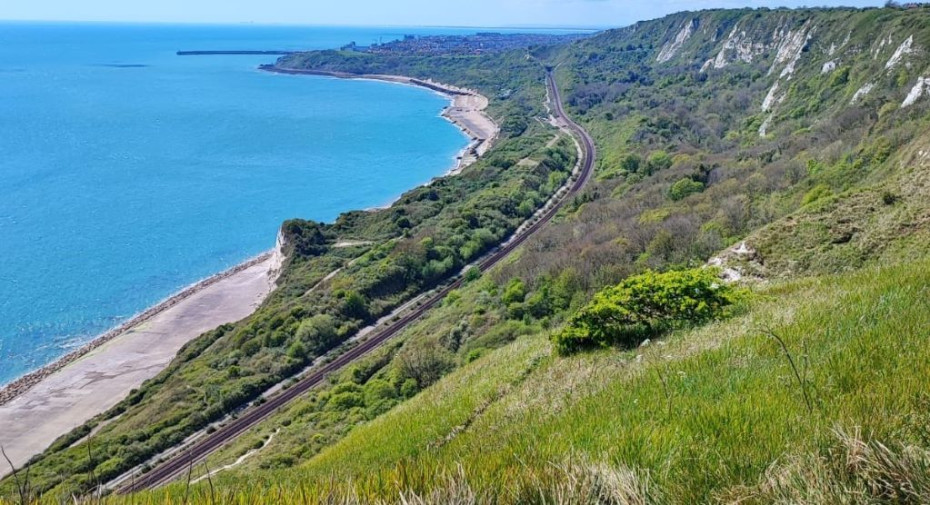
Using rail passes in Great Britain and on Eurostar
Why they can be good idea, plus tips for exploring Britain beyond London by train; and a guide to booking reservations.
Share
Because British trains are operated by multiple different companies, buying tickets for journeys in England, Scotland and Wales can be confusing, so it’s one of the many reasons why using rail passes and ‘rovers’ instead can be a great idea.
They make the taking of the journeys simpler and if you travel far enough when using the pass, they are also money savers.
Note that when you travel with a pass you don't need to also buy tickets - but on most longer-distance routes, you can choose whether to make seat reservations, or you can not bother to do so - train tickets and seat reservations are different things.
Also note that how Eurail and InterRail passes can be used when travelling with Eurostar is totally different to how they can be used on the national rail services.
Reasons for using passes and rovers:
Here are seven other less obvious reasons for why using passes can make it easier to explore Britain by train:
1: There are more than 100 different national rail passes available, many of which are also known as Rover tickets.
Pretty much every holiday location has one including Cornwall, Devon, The Cotswolds and the North Of England; and there are passes which include all of Scotland and all of Wales.
These national rover tickets and passes can be used by visitors to Great Britain.
2: Seat reservations are not mandatory on any British daytime train, so you can just hop on and off whatever train suits you.
3: If you do want to make a reservation there will be no charge for doing so - Great Britain is the only country in which Eurail and InterRail users don’t have to pay for optional seat reservations!
Though InterRail and Eurail users can pay special reservation fees to travel on The Caledonian Sleeper and Night Riviera overnight trains.
4: When using a national pass, including valid Eurail and InterRail passes, or the national passes for Scotland and Wales, you don’t have to care about which company is offering the trains.
Because how these passes can be used in Britain is overseen by an organisation named National Rail and every train company has to abide by its rail pass terms, which in effect means when passes are used correctly, they are valid on any train.
5: When using tickets, longer journeys with connections involving trains operated by different companies can be awkward (purchasing separate tickets per train can be a money saver) - but this isn’t an issue when using nationally valid rail passes.
6: In Britain trains which take slower routes between cities, or make more station calls on a route, are typically cheaper, but with a rail pass it’s best to target the fastest possible journeys, because doing so doesn’t have an extra costs.
7: Some British train operating companies offer complimentary catering in First Class and users of 1st class BritRail, Eurail and InterRail passes receive the same complimentary catering, on many departures operated by Avanti West Coast, Great Western and LNER this is a full meal service!
Britain is the only country in which users of first class Eurail and InterRail passes can access complimentary on-board food and drink, without having to pay a reservation fee!
Using rail passes on Eurostar
InterRail AND Eurail passes can be used on Eurostar trains from and to London if you pay the reservation fee prior to boarding.
The reservation fees for journeys between London and Belgium, France and The Netherlands are 1st class = €38 or €43; 2nd class = €30, €35 or €38.
Seems expensive though these fees can be more than four times cheaper than using tickets.
Users of 1st class passes can book reservations for travel in Standard Premier Class, but users of 2nd class passes can book reservations to travel in Standard Class.
Reservations now available up 6 months ahead and once you have a pass, they can be booked for a fee of €2 per person on the Eurail/InterRail reservation service; the rail pass reservation link on the Eurostar website is now directed at the Eurail/InterRail reservation service.
*= Note that reservations for connecting trains such as TGV or ICE services won't be available this far in advance.
Also note that these terms and 'rules' for how rail passes can be used on Eurostar trains is totally different to how they can be used on national rail services within the UK.
Checking the availability
A key thing worth knowing is that Eurostar doesn't enable rail pass users to book reservations on each specific departure, when tickets reach a certain price.
This higher than typical price is inevitably charged when a departure is especially popular, because the seats at the lower prices will be more likely to have sold out.
So particularly at times of high demand, which tend to be:
- school holidays
- around national holidays,
- summer Fridays to Sundays
the rail pass reservations for specific departures can be taken off sale weeks, or even months, ahead!
Reservations on Eurostar trains can now be booked up to 330 days ahead of the travel date.
If you will need to travel by a specific Eurostar departure, you'll want to check that rail pass reservations are available for the train you need to take prior to buying a pass
The availability can be looked up on Rail Europe and B-Europe without the need to already have a pass number - which is generated by a Eurail / InterRail purchase
Though you will need a pass number to go ahead and book, so you cannot book the rail pass reservations before buying a pass.
Also avoid thinking, 'great I can see the reservations, so I'll book the pass now and go back to Rail Europe or B-Europe tomorrow' - because at busy times the reservations can be become unavailable by the time you go back online.
Worth knowing is that before you have a pass, the function of the Eurail and InterRail 'timetable' tool is to show which departures require a reservation.
The timetable tool / online reservation service will only show the actual availability per departure, once you have purchased a pass, received a pass number and can then log-in.
Therefore before you have a pass, so can't log-in, the InterRail/Eurail websites will tend to show seats as available on every departure - so don't assume that is the situation!
The key thing is to avoid is buying a pass and assuming Eurostar reservations will be available, and then discovering that they aren't, on the train you need to take.
Travel planning
Particularly in summer, it can be a good idea to maximise the flexibility of making a successful booking, by arranging an itinerary so that Paris or a city in Belgium, are the first or last stopover points on the travel day.
This is because it's seemingly rare for every Eurostar to have its rail pass allocation sold out on a travel date, but it's more common for only evening departures to have availability.
Or if reservations are still available for London ↔ Lille journeys when London ↔ Paris isn't available, an option is to book the Eurostar reservation to or from Lille, and then make separate reservations on the trains between Lille and Paris.
The more expensive ticket prices tend to be inevitably charged on the specific Eurostar departures which have the best connections in Bruxelles, Lille and Paris, for travel to and from more distant destinations.
So it's these trains, with the good connections, on which the rail pass reservations can be taken off sale soonest.
Booking the reservations
RailEurope now sells reservations on Eurostar trains to and from London without the need to pay a booking fee
Simply click on 'Add a rail pass' when looking up a journey - and Rail Europe will 'ask' you which type of Eurail or InterRail pass you will be using.
Though if you will be using 1st class passes, what can be confusing is that you will initially only see the prices of the reservations for travel in Standard Class.
The reservations for travel in Standard Premier Class, which users of First Class passes can book, can only be found when using the drop down tool - circled on the image below.
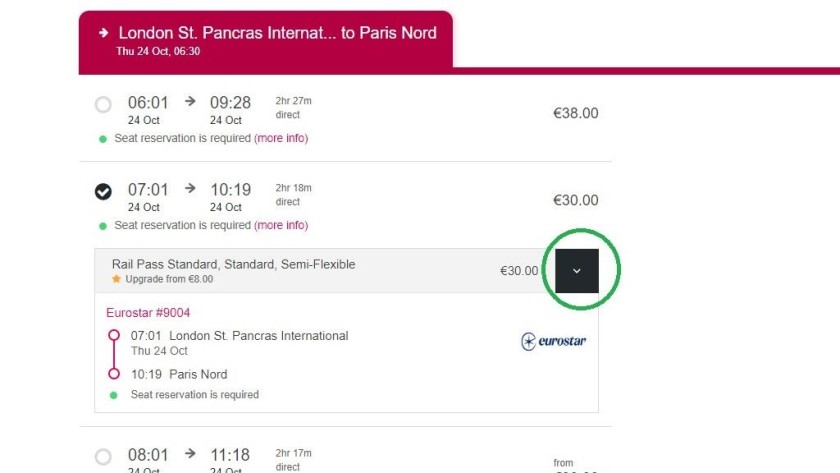
Though another source of confusion on Rail Europe's highly useful service, is that rail pass reservations can only still be available to book on a specific departure, in either Standard Class OR Standard Premier Class.
If they are only still available in Standard Class, the drop down menu, which typically gives access to the Standard Premier Class reservations, won't be available.
If they are only available in Standard Premier Class, the prices you will first see are for travel in Standard Premier Class - And it won't be explicitly clear that Standard Class has sold out.
So check the terms before you book.
Using B-Europe
If you opt to use the paper version, or now the mobile* version, of the Eurail/Interrail pass, Eurostar reservations can also be booked on B-Europe up to 330 days ahead of the travel date.
*= Using B-Europe's reservation service had only been an option for users of paper passes, as the type of numbers used for mobile pass users are rejected by B-Europe
But new online services have been launched which enable mobile pass users to obtain the necessary paper pass numbers.
Eurail mobile pass purchasers can use this pass number generation service and InterRail mobile pass purchasers can this pass number generation service.
However, B-Europe will only sell the reservations a 'mobile tickets', which incur a €4 surcharge.
So booking with B-Europe is more expensive than using either RailEurope or the Eurail and InterRail reservation services - But reservations can be available for a specific departure on B-Europe, when they are not available with Eurail or InterRail.
UK residents using InterRail passes
UK residents should also note that Eurostar reservations will only be valid when making one outward journey and return journey from and to the UK.
So if you were to follow an itinerary which involves heading back to the UK and then, for example, heading off later for a few days to travel around The Netherlands, you wouldn't be able to use the pass on the Eurostars on the second trip to the Netherlands.
Also the journeys within the UK, on which you can use the pass to travel to and from London, need to be on the days that you will heading off to continental Europe or returning - so it's not possible to stay overnight in London before or after taking a Eurostar.
The reason being is that a maximum of two travel days (out and back) is permitted in the resident country of a pass user, and the journey on the Eurostar is counted as a day of use.
Alternatives to the Eurostar
The reservation fees for Eurail and InterRail users of €38-43 in 1st class/Standard Premier and €30-38 in 2nd class/Standard Class on Eurostar trains can be good value compared to ticket prices, so if they are still available and you won't mind being whizzed under the English Channel in a tunnel, paying for them is typically the best option
If the limited number of rail pass reservations made available by Eurostar are sold out on your travel dates; and this can happen weeks ahead in the summer, the optimum alternative is to travel between London and Paris on a combination of trains and cross-Channel ferries.
On the Calais ↔ Dover sea crossing P&O Ferries offers bookings as foot passengers on certain departures.
Eurail and InterRail passes are not valid on the P&O ferries so foot passenger tickets will need to be booked.
Foot passengers need to check-in at the ferry terminals 90 mins prior to departure.
Eurail and InterRail passes are valid at no additional charge, on the Southeastern trains between Dover and London, including its hi-speed services to/from St Pancras International station.
Tough it's worth verifying if other stations in central London will suit you better; There are direct trains from Dover Priory station to Charing Cross, to London Bridge and to Victoria.
Reservation fees of €1.50 need to be paid by Eurail and InterRail users on the TER trains between Paris and Calais, they can be purchased at ticket counters.
The typical connections, according to the usual timetable, are listed below:
From Paris to Dover on Monday to Friday
- 10:31 from Paris Nord to Calais Ville, arrives Calais at 13:32
- Check-in for the 17:20 sailing before 15:50
- Arrive Dover at 17:50 (due to the time difference)
From Paris to Dover on Saturday
- 08:31 from Paris Nord to Calais Ville, arrives Calais at 11:26
- Check-in for the 14:35 sailing before 13:05
- Arrive Dover at 15:35 (due to the time difference)
From Paris to Dover on Sunday
- 09:31 from Paris Nord to Calais Ville, arrives Calais at 12:29
- Check-in for the 14:35 sailing before 13:05; note that the train and shuttle bus will need to be on time
- Arrive Dover at 15:35 (due to the time difference)
From Dover to Paris daily
- Check-in for the 14:00 sailing before 12:30
- Depart Dover at 14:00 and arrive Calais at 16:30; (due to the time difference)
- Depart Calais-Ville station at 17:36 or 17:38; arrive Paris Nord at 20:29 on Sat/Sun and 20:56 on Monday to Friday.
Using passes when visiting Great Britain
If you are not resident in the UK you can use the multi-country Eurail and InterRail 'global' passes to see Britain by train, in addition to other countries of your choice; Though you'll need to be sure that your trip to and from England / Scotland / Wales falls within your selected period of time that your pass will be valid for.
For European citizens InterRail for Great Britain passes are available for 3, 4, 5, 6 or 8 days of non-consecutive travel.
Everybody else who solely wishes to explore Britain by train can make use of BritRail passes - and if you will be travelling as a family group, each adult can take one child aged 15 and under with them at no extra charge!
Though if you meet the InterRail criteria and aren't resident in the UK, there are BritRail passes valid for two days of travel which are cheaper than those InterRail passes valid for 3 days.
Also if you buy a BritRail pass you can use it for two for the price of one admission to a swathe of tourist attractions.
Eurail passes are not available solely for travel in Great Britain.
With any of these passes you can hop on any daytime national rail service, reservations are available but optional on most long-distance routes; and on daytime trains there will be no charge for making the reservation.
Though special rates are available to rail pass users on the Caledonian Sleeper and Night Riviera services.
Users of Eurail and InterRail 'global' passes can also book reservations on Eurostar, which can seem pricey, but the cost per day of using the pass + the reservation fee, is often much cheaper than booking Eurostar tickets.
However, BritRail passes are not valid on the Eurostar.
Seat reservations for journeys within Britain:
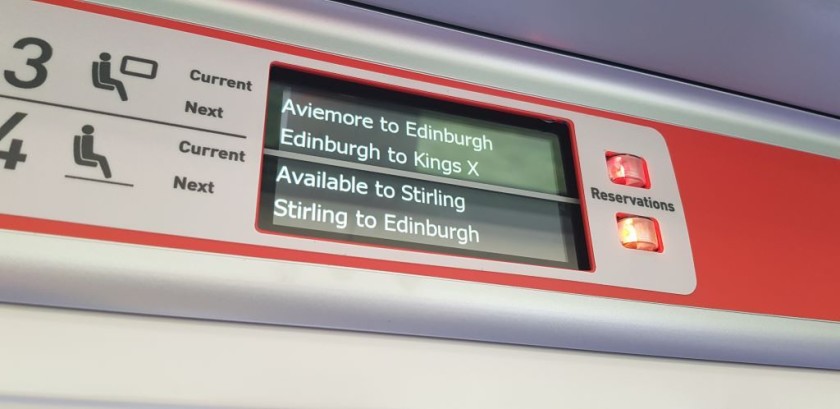
Seat reservations are only available on certain journeys/routes.
If you'll be travelling long-distance on trains operated by: Avanti West Coast; CrossCountry; EMR; Grand Central; Great Western Railway; Hull Trains: LNER; ScotRail and TransPennine Express, then seat reservations will be an option; They aren't mandatory.
Discover which routes are operated by each TOC
Journeys on which seat reservations are available:
Trains between London and both Scotland and the North of England are operated by Avanti West Coast and LNER; though on separate routes.
The trains between London and North Wales are also operated by Avanti West Coast.
Great Western Railway operates the trains between London and both South Wales and The West Country; which is the collective name for Devon and Cornwall.
TFW makes reservations available for journeys between England and Wales and on its services between North and South Wales.
Popular routes which can be reserved:
- London Euston ↔ Birmingham, Chester, Glasgow, Holyhead, Liverpool, Manchester and The Lake District
- London King's Cross ↔ Aberdeen, Durham, Edinburgh, Leeds, Inverness, Newcastle, Perth, Stirling and York
- London Paddington ↔ Bath, Bristol, Cardiff, Exeter St Davids, Oxford, Plymouth, St Austell, Swansea and Truro
- Edinburgh ↔ Aberdeen, Birmingham, Bristol, Durham, Inverness, London, Manchester Newcastle and York
- Glasgow ↔ Aberdeen, Birmingham, Fort William, Inverness, London, Oban and Manchester
- Manchester ↔ Birmingham, Bristol, Cardiff, Edinburgh, Glasgow, Holyhead, London, Newcastle, The Lake District and York
Journeys on which seat reservations are NOT available:
Seat reservations are not available when using rail passes and making journeys on trains operated by: c2c; Chiltern Railways; Great Northern; Greater Anglia (London ↔ Norwich excepted); London NorthWestern Railway; Northern; Southern; Southeastern; South Western Railway and Thameslink.
Popular routes which cannot be reserved:
- London ↔ Brighton, Cambridge, Dover, Gatwick Airport and Portsmouth
- Glasgow ↔ Edinburgh
- Manchester ↔ Liverpool
- Newcastle ↔ Carlisle
Good to know if you want to avoid making seat reservations:
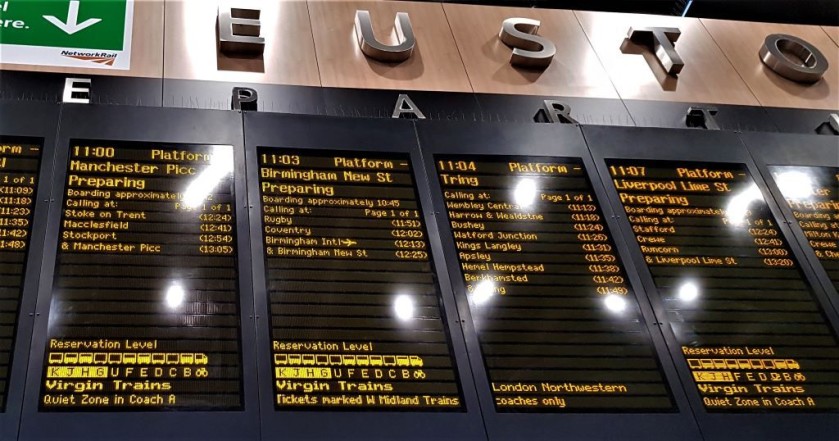
If you would rather be spontaneous when taking long-distance train journeys in Britain, so won't want to bother with making seat reservations, here are five things to keep in mind:
1: Many British rail passes and rovers allow for a set number of days of travel, so in the summer in particular, it can be a good idea to travel on a Monday to Thursday.
Express trains tend to be busiest on Friday evenings, Sunday afternoons and summer Saturday mornings.
2: On the departure boards at some major stations, the details of each departure are shown in columns and at these foot of these columns are diagrams of the train formation, which look like something you last saw in a mathematics class.
They show the reservation levels in each coach of the train, so in effect they are telling the travelers who don’t have reservations, which coaches will have the most spare seats available.
On that above image, if you wanted to take that 11:00 departure to Manchester Piccadilly, the coaches to target when boarding would be C, D, U, G and K.
3: On the LNER Azumas, the Avanti Pendolinos and the ScotRail Inter7City services, one coach in Standard Class is typically set aside for travelers who don’t have reservations; but on some departures these coaches can be exceptionally busy.
4: If you arrive at major station at which long-distance trains commence their journeys, such as Edinburgh Waverley, Glasgow Central, Liverpool Lime Street, London Euston, London Kings Cross, London Paddington or Manchester Piccadilly and a long-distance train to your destination is leaving within the next 5 or 10 mins, avoiding thinking ‘great, I’ll just hop on’.
Most passengers will have already boarded, so the train will probably be already busy and the luggage storage will likely be full.
Most long-distance rail routes in Britain have at least one or two trains per hour, so take your time and check when the subsequent train will be departing.
Being at the station when the departure details are confirmed, so that you can be among the first to head for the train, can lead to a much less stressful boarding.
5: Because seat reservations aren’t mandatory on British trains, there is info associated to each seat on the train, which shows the stations between which it has been reserved.
No destination info = an available seat for the entire journey; and on some of the newest British trains including these and these and these, green lights indicate a seat(s) which haven’t been reserved at all.
On busy trains it’s worth doing some detective work to check whether a seat, which has been reserved for part of a journey, will in fact be available between your stations.
If you haven’t lucked out when boarding keep an eye on reserved seats which have yet to be occupied - the person that has booked it may not have boarded, or chosen to sit somewhere else.
Also many long-distance trains also double up as commuter services, meaning that many people leave the train at its first station call, less than 25 mins into a journey.
This can be a common occurrence on these journeys in particular:
- Birmingham New Street → Coventry
- Bristol → Bath
- Edinburgh → Dunbar
- Leeds → Wakefield
- London → Reading
- Manchester → Stockport
- Newcastle → Durham
When making reservations is recommended:
Not having to make reservations can be a big plus of using rail passes, including InterRail and Eurail in Great Britain, but some British train services can be prone to overcrowding.
So it can be good idea to make the effort to reserve seats:
- On trains departing major cities between 16:00 and 19:30, particularly on Fridays.
- On trains to and from major cities on Sundays which depart between 15:00 and 19:00.
- When travelling long-distance to and from holiday areas such as Cornwall, Devon, Scotland, Wales and pretty much anywhere by the coast; particularly on Saturdays between mid-May and the beginning of September.
- On any train on the days either side of national holidays.
Particularly make reservations at these times if you will be joining a train heading to London at an intermediate station such as Bath, Chester, Exeter, Taunton or York; spare seats can be harder to track down when joining an already busy train.
Also when travelling at those times it can be a particularly good idea to make reservations if you will be travelling with a First Class pass.
On many long-distance trains including the LNER Azumas, the Avanti Pendolinos and the ScotRail Inter7City services, some Standard Class / 2nd class coaches are set aside for travelers who have boarded without reservations, but not in First Class.
First Class seats can sell out completely on the most popular trains between London and both Cornwall and Scotland.
Though seats can’t be reserved by rail pass users on trains operated by c2c; Chiltern Railways; Great Northern; Greater Anglia (London ↔ Norwich excepted); London NorthWestern Railway; Northern; Southern; Southeastern; South Western Railway and Thameslink.
So if you’re intended route is by taking such trains, try to avoid travelling at those times listed above.
Booking the reservations:
If you will be travelling with a rail pass you won't typically be able to arrange seat reservations at stations at the last minute just before boarding; though as with so many aspects of British train travel, there can be exceptions.
- When travelling by Cross Country (some routes); Great Western Railway; Hull Trains, TFW and Scotrail, you'll need to have requested a reservation around 2 - 3 hours ahead; though this isn't fixed.
- For journeys by Avanti West Coast; CrossCountry (most routes); EMR; Grand Central; LNER and TransPennine Express, the time limit for reservations will be between around 15 mins and an hour prior to departure.
Check which company operates each route
So if you want to set off in the morning, you will often have needed to make reservations by the end of the previous day; and it can be a good idea to do this regardless.
There is no charge for booking a rail pass reservation at stations, but you will need to use a staffed ticket desk (at an Advance Travel desk when available) and not a ticket machine.
Though you can often avoid having to book reservations at stations, many TOCs will enable reservations to be booked by using direct messaging on their social media services.
Using GWR's online reservation service
The online booking service provided by the company GWR offers a ‘seat only’ facility for any journey on which reservations are available; the train doesn’t have to be operated by GWR.
The steps to take are:
- You need to create an account; using your email address as a user name seems to be a failsafe method
- Once you have created an account there'll be a booking link on the top menu; and unless you create an account you won't see it.
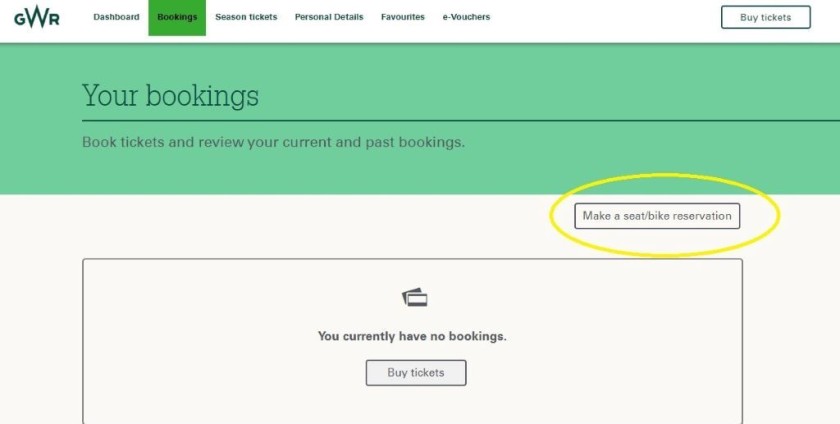
- Click the booking link and this screen show above will appear and on it you will see the 'Make a seat reservation' button
- You then look up a journey as if you will be buying a ticket; though seat reservations are not available on every British rail route because some train companies either don't offer them at all, or only have them available when booking Advance tickets.
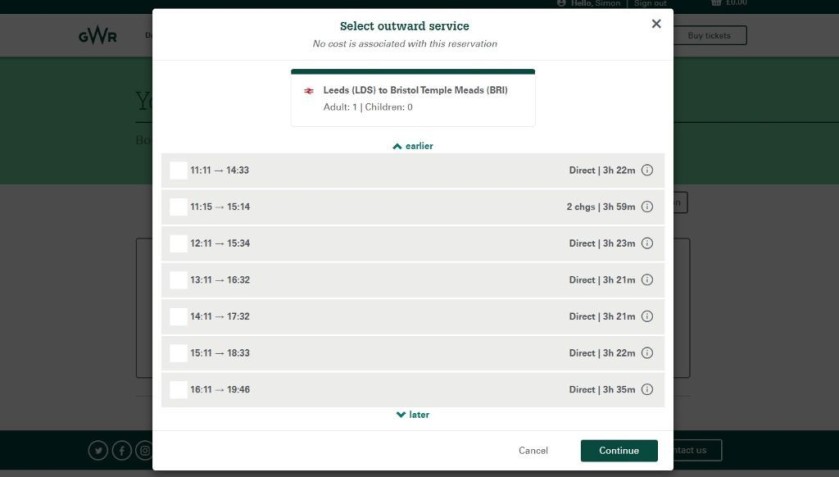
- If reservations are available, you will be automatically offered them on a wide choice of departures on your route so take care to target the direct trains.
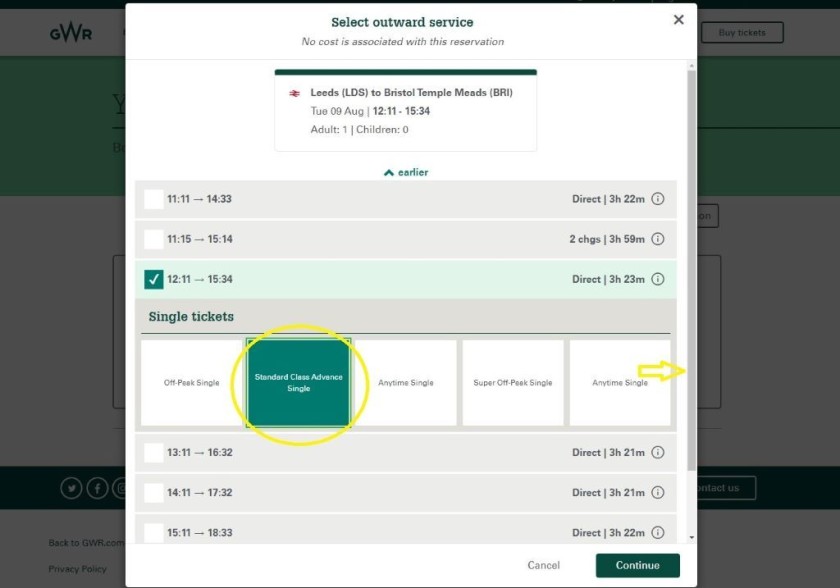
- Then having chosen your departure you will have to choose a type of ticket, but you won't be buying a ticket, instead this is how GWR works out if you will want a reservation in Standard Class (2nd class) or First Class; you will likely have to scroll to the right to see First Class tickets.
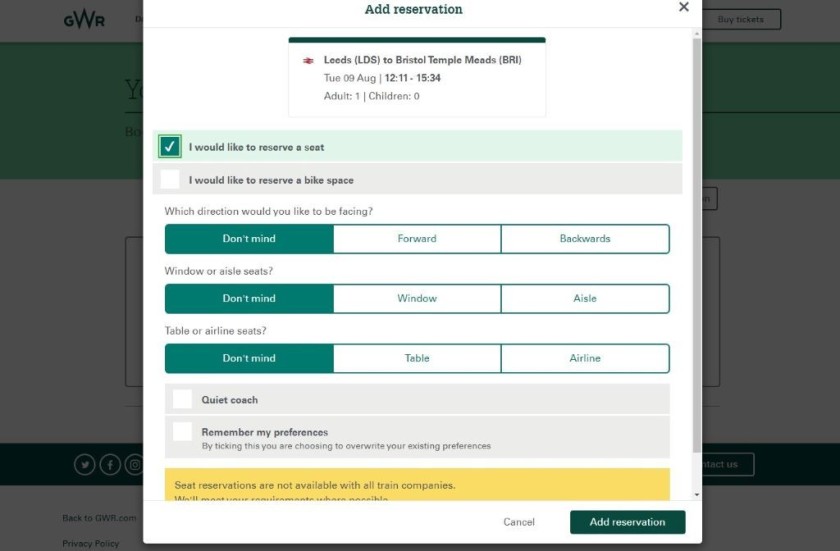
- You will then be able to see a range of options for the type of seat you would prefer, including forward facing seats, but you can't select specific seats from a seating plan.
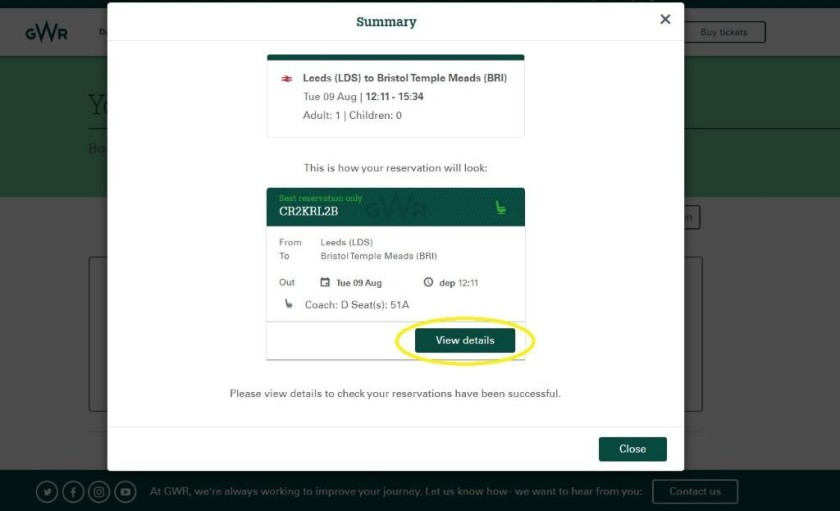
- You can then check your booking, by clicking on the 'View Details' button, having done so, if you see 'Completed'...
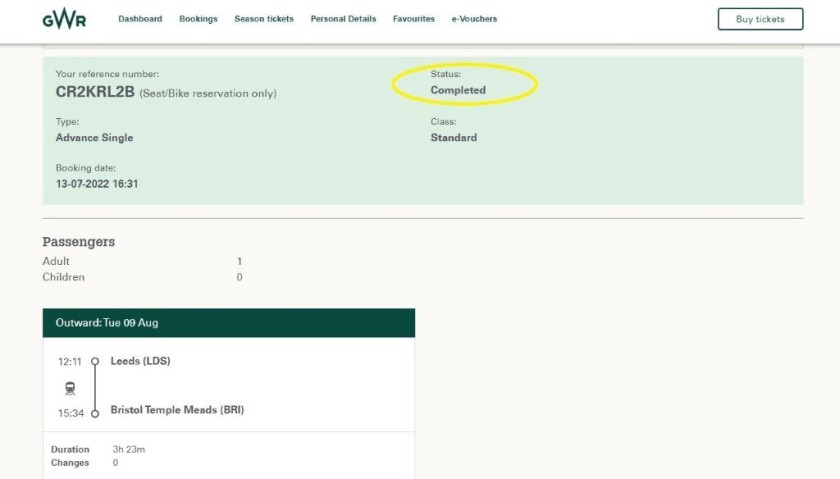
...you'll automatically be sent an email containing the details of the coach and seat number that you have reserved.
Travelling on the Caledonian Sleeper
If you will be using a valid rail pass on the Caledonian Sleeper you can travel in a reclining seat at no additional charge, but you must reserve a place prior to boarding, by calling the Guest Service Centre on 0330 060 0500.
If you want to travel in a bed in a Club Room sleeping cabin, you need to pay a 'Room only supplement' of £170 if you will be travelling solo, or £200 if two people will be travelling together.
If you want to travel in a Classic Room sleeping cabin, the supplement is £120 for solo travellers and £140 if two people are travelling together.
These 'Room only supplements' can be booked online.
Itinerary Planning Tips for BritRail, Eurail & InterRail users
The fact that using, Britrail, InterRail and Eurail to travel beyond London can be less complicated and cheaper than using tickets, are great incentives to see the best of Britain by train.
It isn’t a particularly large country, so getting away from London to experience other cities and dramatic landscapes doesn’t require exceptionally long journeys.
If you only want to base yourself in London then it’s possible to make easy day trips by train to other great cities such as Bath, Bristol, Liverpool and York.
Though if you'll want to spend extended periods of time away from the capital, here are seven ideas for making that trip as easy as possible.
1: Head over to King's Cross station from Eurostar Arrivals
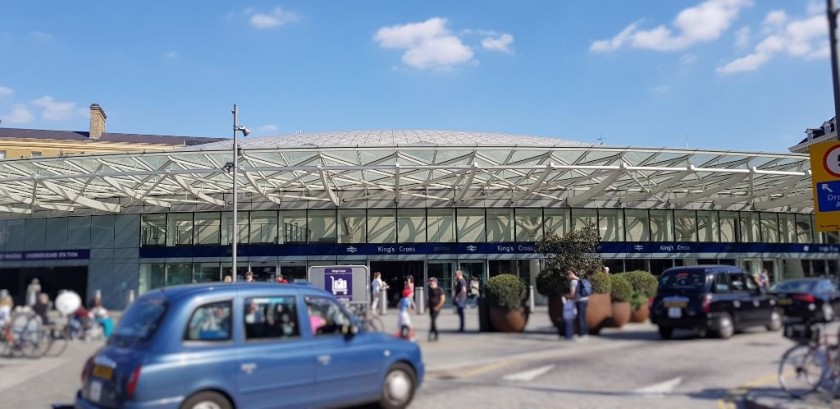
If you want to experience the best of northern England and Scotland, it can be a good idea to head over to King’s Cross station just after your Eurostar train will have arrived in London.
King's Cross has trains to Yorkshire and Scotland, which call in numerous great cities including Durham, Edinburgh, Leeds, Newcastle and York.
You’ll be tempted to dive in and experience the UK capital, but instead leave this until you will be making your return journey back to continental Europe.
As suggested below, you can then de-risk being in time to check-in for your Eurostar departure back to Belgium, France or The Netherlands, or your flight home, by making a simple transfer from a location in central London on your departure day.
King’s Cross station is just across the street from St Pancras International, which is where the Eurostar will arrive, so you can avoid the hassle of taking the Underground etc.
So even though you have just been on a Eurostar, you can exploit this easy transfer to head on to somewhere fabulous north of London.
If you want to experience the North of England on your trip, in only around two hours later, you can be in Leeds or York.
On the next day of your travels, there will be very frequent trains from York to Edinburgh and beyond.
on to Manchester
If you will be heading on to Manchester, you can avoid the transfer from St Pancras to Euston station by taking from St Pancras to Sheffield and connecting there for Manchester.
There are one or two connections per hour and the end-to-end journey will take around 3hr 30mins.
2: Explore the north of England from Leeds and Manchester
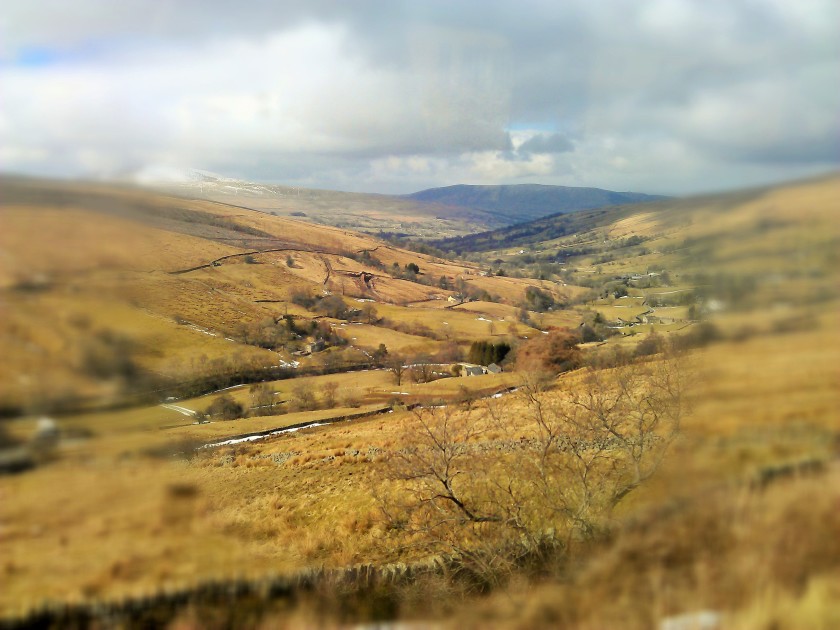
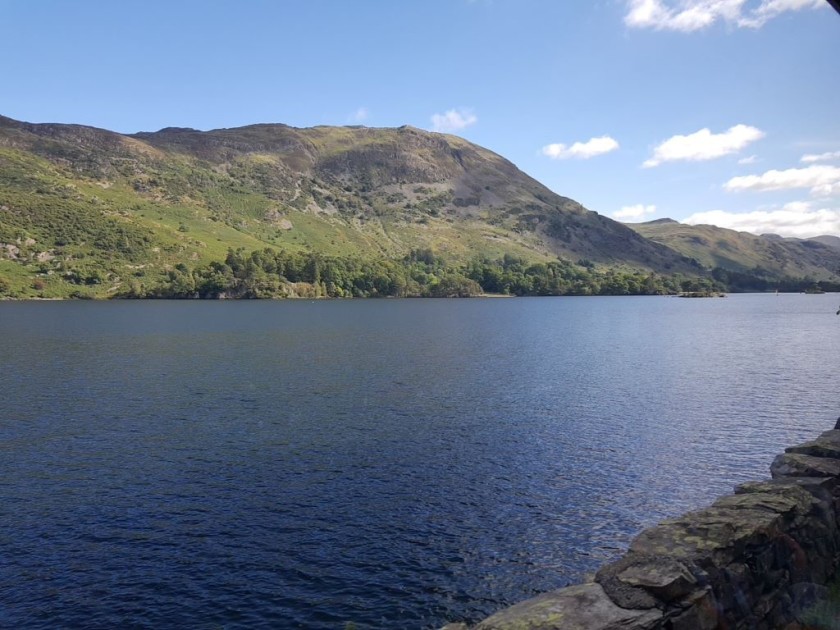
Leeds is a great base for exploring dramatic Yorkshire by train and it’s also the starting point of England’s most beautiful railway route, the Settle and Carlisle line.
If you want to pack as many scenic journeys as possible into you Eurail and InterRail itinerary then the route to take is London → Leeds → Carlisle → Edinburgh or Glasgow.
Or connect in Sheffield and head on to Manchester, because taking this route from King's Cross avoids the awkward transfer from St Pancras over to Euston station, which is where the direct trains from London to Manchester depart from.
From Manchester you can experience the best of Liverpool in a day, or take a day trip to the stunning Lake District
And Manchester also has frequent trains on to both Edinburgh and Glasgow.
3: Or whizz off to Scotland
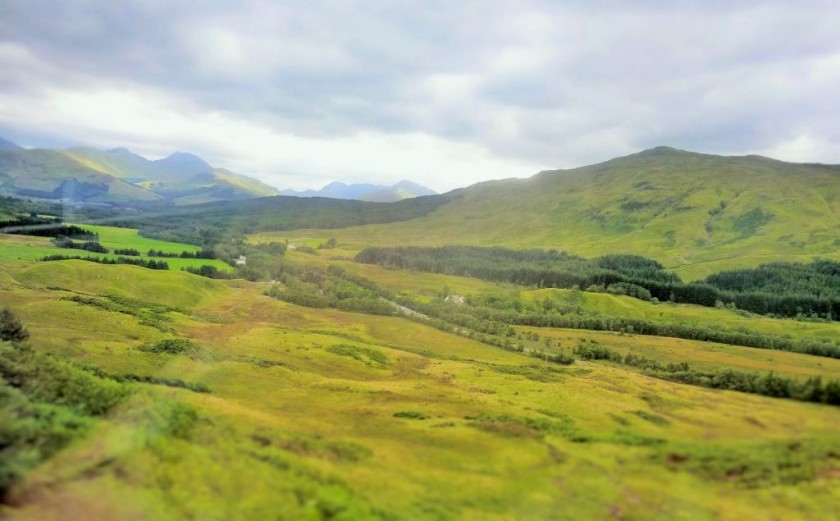
Though if you only want to include Scotland and London on your itinerary it’s best to head over to King’s Cross from Eurostar arrivals and board a train to Edinburgh.
Though if your time is short and you also want to experience the drama of the Highland scenery, connect in Edinburgh for the short journey on to Glasgow - The trains on the beautiful West Highland Line depart from Glasgow.
If Glasgow is where you want to spend a couple of nights, not least because its room rates tend to be cheaper than in Edinburgh - heading there from King’s Cross saves the bother of making the transfer over to Euston station from St Pancras.
There are at two to four trains per hour on from Edinburgh to Glasgow, which you can hop on with a vaild pass.
Glasgow is a great base for seeing the best of Scotland by train, and Edinburgh can be experienced in full as a day trip from Scotland’s largest city..
Or if you want to base yourself in the Highlands for the Scottish element of your adventure, time your arrival in London so that you can connect with the Caledonian Sleeper train, which departs from Euston; Though this is a service which pass users need to reserve in advance.
Mixing Spirit of Scotland with Eurail and InterRail
If you’ll be using the type of Eurail and InterRail Pass restricted to a set number of travel days, but also want to spend an extended period of time in Scotland, you can use your ‘Global Passes’ to travel to and from Scotland and purchase a Spirit Of Scotland pass once you arrive there.
The plus of the Spirit Of Scotland pass over Eurail / Interrail is that it includes the bus routes that bridge gaps in the Scottish rail network, such as Inverness to Fort William.
4: Visiting The Lake District
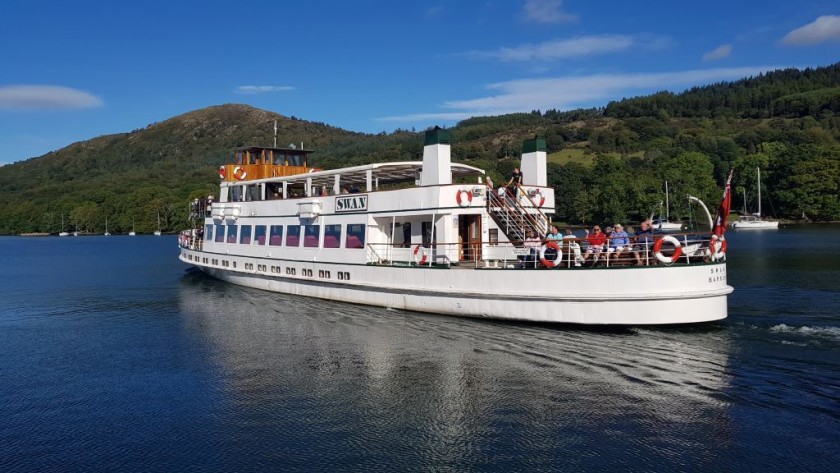
If you want to include both Scotland and The Lake District on your British adventure by train, you can take direct trains from Edinburgh and from Glasgow to Penrith North Lakes station.
Buses, which stop at the station, link it to multiple beautiful destinations, including Bowness, Cockermouth, Keswick and UIlswater.
Or you can see both Ullswater and Windermere or an easy day trip from Manchester.
If you want to experience The Lake District and skip Scotland, there are direct trains from London to Penrith North Lakes, which connect with the buses to Cockermouth, Keswick and UIlswater.
Or if you want to head to Boweness-on-Windermere, take a train from London to Oxenholme and connect there for a local train on to Windermere station.
5: Experiencing Wales
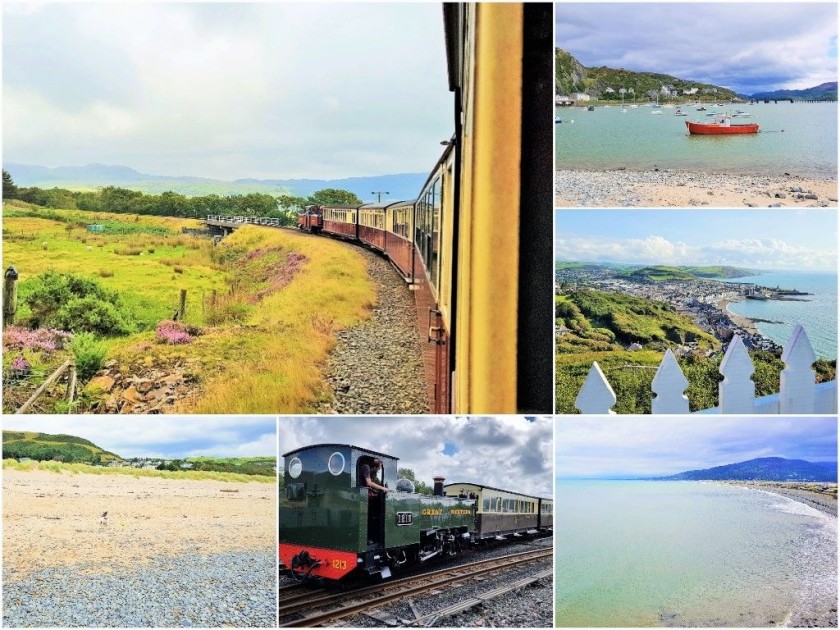
The railway along the Welsh north coast to Llandudno, Bangor and Holyhead, from where the ferries to Dublin can be boarded, has direct trains from both London and Manchester; reservations are recommended on these trains.
The trains from Manchester also call at Warrington Bank Quay station where connections can be made with trains from both Edinburgh and Glasgow.
If you want to head to the delightful towns on the picturesque Cambrian Coast, you can then ride the ‘Great Little Trains Of Wales’ which are available from Aberystwyth, Towyn and Porthmadog - though rail passes are not valid on these trains.
These towns on the Cambrian Coast have direct trains from Birmingham; - which have connections from London at Birmingham International station; and from Manchester in Shrewsbury.
If you want to spend a couple of days in this area, pretty Machynlleth is a great base for exploring by train.
There are no direct conventional trains between the Cambrian and North Wales coasts, but there are two enchanting routes, which involve riding steam trains for part of the journeys; Though these steam trains aren’t included with Eurail / InterRail and tickets are fairly expensive
- Take a bus between Bangor, which is on the North Wales coast rail route, and Caernarfon , and connect with the Welsh Highland Railway and its steam trains which travel between Caernarfon and Porthmadog.
- Take trains between Llandudno or Llandudno Junction and Blaenau Ffestiniog; and connect with the amazing Ffestiniog Railway for a journey between Blaenau Ffestiniog and Porthmadog.
6: Heading to Devon and Cornwall
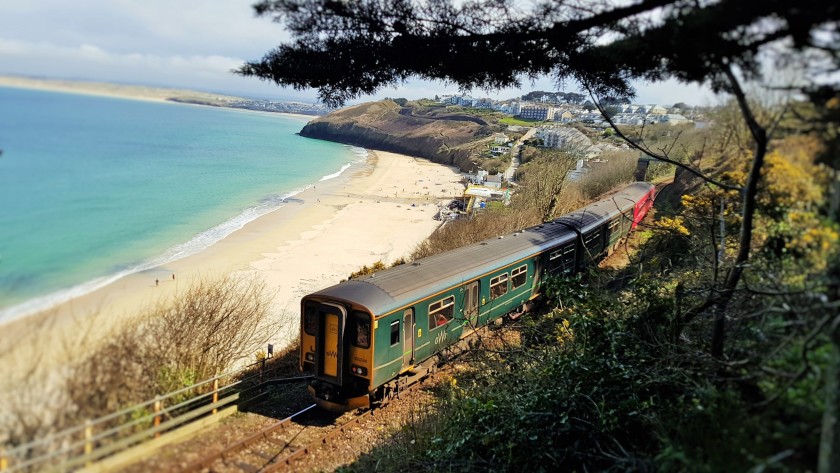
There are direct trains from London to Devon and Cornwall including the Night Riviera service which needs to be reserved in advance.
Though if you want to take the daytime trains from Paddington to destinations between Exeter and Penzance, it’s a good idea to take up the free option of reserving seats; Particularly as the operator of these trains, GWR, has a highly useful online seat reservation service (see above).
However. if you want to include ‘The West Country’ along with the Scotland and the north of England on your around Britain adventure, it’s best to head to Devon and Cornwall from those areas.
My routing recommendation would be London → Scotland → The North Of England → Devon/Cornwall → London.
The rail routes which link Scotland and The North with The West Country are operated by a rail company aptly named CrossCountry.
It offers direct trains to Devon and Cornwall from Edinburgh, Newcastle, Leeds and York.
Though if you want to head in this direction from Manchester, you’ll need to change trains; And the most convenient station in which to do so is at Cheltenham Spa, because at that station all the trains heading south use the same platform.
If possible avoid making connections at Birmingham New Street, as it’s Britain’s most confusing station.
No matter where you will be boarding a CrossCountry service it’s always a good to reserve in advance for journeys by its trains, it operates some of Britain’s busiest rail routes.
7: Save London until last
You will have had to reserve on the Eurostar train back to continental Europe, so you’ll want to be sure of being at St Pancras International station in time to check-in for it.
So it’s a less risky strategy to avoid taking a train to London, in order to then connect into the Eurostar - hence the suggestion to spend your time in London in the days ahead of taking the return Eurostar.
Though if your train to London will be arriving at King’s Cross, you’ll only have to head across the street to access Eurostar departures.
Please support ShowMeTheJourney
This second version of ShowMeTheJourney is exciting and new, so we are genuinely thrilled that you are here and reading this, but we also need your help.
We’re striving not to let anything get in the way of providing the most useful service possible, hence a facility has been set up with DonorBox which can be used to support the running costs and make improvements.
Instead of advertising or paywalls, your financial support will make a positive difference to delivering an enhanced service, as there’s a lot of ideas which we want to make happen.
So if you have found the info provided here to be useful, please go here to say thank you.

Simon Harper
I wanted to share my passion for train travel and explain how anyone can take the fantastic journeys I have taken.

This is one of more than 100 train travel guides available on ShowMeTheJourney, which will make it easier to take the train journeys you want or need to make. As always, all images were captured on trips taken by ShowMeTheJourney.
This second version of ShowMeTheJourney is exciting and new, so we are genuinely thrilled that you are here and reading this, but we also need your help.
We’re striving not to let anything get in the way of providing the most useful service possible, hence a facility has been set up with DonorBox which can be used to support the running costs and make improvements.
Instead of advertising or paywalls, your financial support will make a positive difference to delivering an enhanced service, as there’s a lot of ideas which we want to make happen.
So if you have found the info provided here to be useful, please consider saying thank you.










